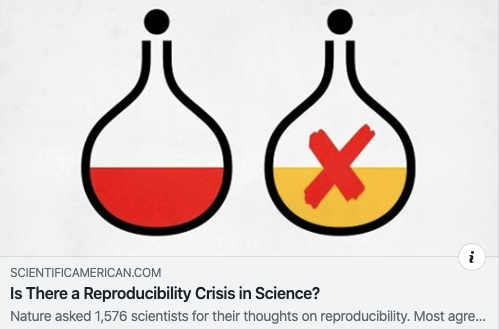|
By whom and when? And why should we care? Let me clear: I am not one to invoke the fallacy of “science has been wrong before” so much as remind people that a given proposition sits atop many unsettled variables.
There has been a crisis in science for a while. Essentially there are 3 critical problems plaguing any “scientific truth” we’d all like to be settled: 1.) little-to-no reproducibility 2.) falsified results 3.) consensus is overblown As to the first problem, it’s no small issue, since the scientific method requires reproducibility. Yet, 70% of scientists have failed to replicate test results: https://www.scientificamerican.com/…/is-there-a-reproducib…/ The majority of the time, no one can replicate an experiment whose results are driving societal beliefs. This is kind of a big deal. As to the second problem, 2% of scientists admit to fabricating test results, while around 15% admit to knowing others who have: https://www.ncbi.nlm.nih.gov/pmc/articles/PMC2685008/ Thus, the majority of the time there is no replication. And part of the time people are just falsifying data or fabricating results. This leads us to the third issue: consensus. As a mildly educated reader might have already surmised, the first two problems cast consensus into a wastebasket of uselessness. However, even if we completely ignored the first two problems, consensus has skeletons in its own closet. Namely, 1% of scientific authors represent over 41% of research papers and over 87% of the papers whose citations exceed 1000: https://www.researchgate.net/…/263776839_Estimates_of_the_C… Immediately you can see the consensus issue. If we survey pertinent published papers, we’re actually only getting the opinions of 1% of researchers. If we survey scientists directly, we are gathering insights from people who’ve been disproportionally informed/influenced by only 1% of authors. Therefore, getting to consensus as a valuable tool is a fallacy. Even if we could dig down into it, we would be confronted with the first two problems. And that’s to mention nothing of the typical human attraction to popularity. Popularity does not equate to rightness. This is why I encourage people to conduct science and study mechanisms. You can find all of the statistical and epidemiological support for a argument, and it is sitting atop three unstable pillars. But mechanisms and empiricism don’t care about those unstable pillars. Conducting experiments and studying mechanisms doesn’t get waded down in the lies of researchers, the popular trends, or the Pollyanna naivety which thinks that a finding must’ve been replicated. Test blood sugar. Fast. Run one single scientific experiment for crying out loud. Forget the “experts.” People have tried to weigh me down in debates over opinions. I don’t care about opinions. I don’t care if the whole panel of the American Heart Association believes it’s impossible to reverse heart disease. I don’t care what your guru said. I don’t care if the whole roster of contributors to the National Diabetics Committee believes you can’t reverse diabetes. Science doesn’t care about opinion. Propose a mechanism. Argue mechanisms. What is the biological mechanism supporting a health or fitness hypothesis? And even when there might be a proposed mechanism, let’s still run the experiment. Let’s try to reverse heart disease. Let’s try to reverse diabetes. Why would expert opinion or consensus lead us to stop seeking truth, stop conducting experiments, stop searching? Clients and friends ask me to make sense of how one day eggs were bad, then good, then bad, then good again. Or they ask why red meat was bad, then good, then bad, then good again. Nothing is bad or good. Let’s talk mechanisms. HOW is substance X beneficial or detrimental? Let’s discuss THAT. Then, let’s conduct science and see what happens. In my personal experiments, eating piles of egg yolks and three pounds of red meat per day, my cholesterol panel became OPTIMAL. I lost all visceral fat. My risk factors for disease evaporated. That’s a fairly final outcome; but I still wouldn’t consider it CONCLUDED. Inquiry is ongoing. Science is a big tent. Under it exists many scientifIC pursuits. “Scientific” must be differentiated from “science.” There are scientific pursuits which involve non-empirical and non-testable propositions. Those can never be “settled.” Unless we are talking a directly observable, replicable, verifiable and verified system, “settled” is anywhere between hyperbolic and purposely misleading. Trying to jump to the conclusion by slapping “consensus” on it is dishonest anti-intellectualism. Give me mechanisms. We’ve all had enough with the opinions.
0 Comments
Your comment will be posted after it is approved.
Leave a Reply. |
Elev8 Wellness
|
LIVE. AWESOME.We offer the highest quality in personal fitness, nutrition, and mindset coaching, helping you achieve your fitness, health, wellness and performance goals no matter the obstacle. With virtual online training and private, in-studio training we make it easier to reach your wellness goals safely.
No more can't. No more not good enough. If you compete in a sport, let your mind no longer hold you back from being the greatest. If you don't, let your mind no longer hold you back from being the best version of you that you can be. Sign-up for a Tour Covid Screen Waiver Elev8 Waiver Become an Elev8 Instructor Space Rental |
6244 lyndale ave. s., minneapolis, mn 55423
|
© 2021 Elev8 Wellness LLC. All Rights Reserved. site map | contribute | SITE BY Sproute Creative


 RSS Feed
RSS Feed
